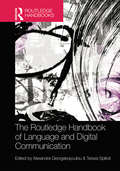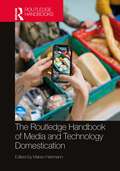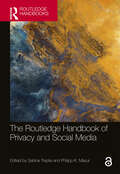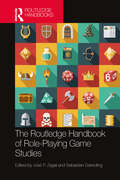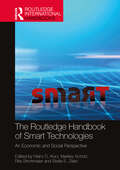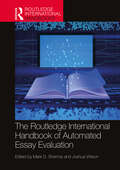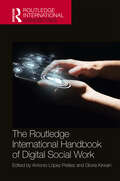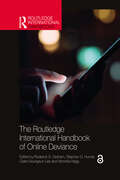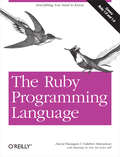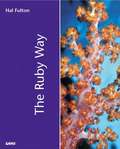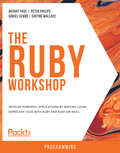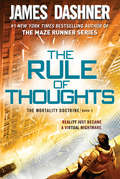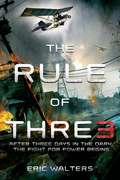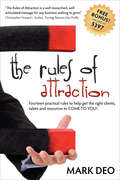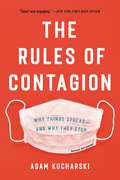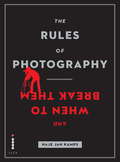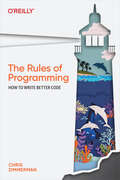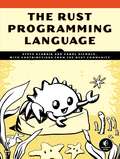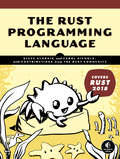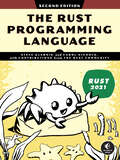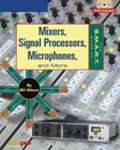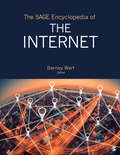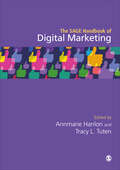- Table View
- List View
The Routledge Handbook of Language and Digital Communication (Routledge Handbooks in Applied Linguistics)
by Alexandra Georgakopoulou Tereza SpiliotiThe Routledge Handbook of Language and Digital Communication provides a comprehensive, state of the art overview of language-focused research on digital communication, taking stock and registering the latest trends that set the agenda for future developments in this thriving and fast moving field. The contributors are all leading figures or established authorities in their areas, covering a wide range of topics and concerns in the following seven sections: • Methods and Perspectives; • Language Resources, Genres, and Discourses; • Digital Literacies; • Digital Communication in Public; • Digital Selves and Online-Offline Lives; • Communities, Networks, Relationships; • New debates and Further directions. This volume showcases critical syntheses of the established literature on key topics and issues and, at the same time, reflects upon and engages with cutting edge research and new directions for study (as emerging within social media). A wide range of languages are represented, from Japanese, Greek, German and Scandinavian languages, to computer-mediated Arabic, Chinese and African languages. The Routledge Handbook of Language and Digital Communication will be an essential resource for advanced undergraduates, postgraduates and researchers within English language and linguistics, applied linguistics and media and communication studies.
The Routledge Handbook of Media and Technology Domestication
by Maren HartmannThis Handbook offers a comprehensive overview of media domestication – the process of appropriating new media and technology – and delves into the theoretical, conceptual and social implications of the field’s advancement. Combining the work of the long-established experts in the field with that of emerging scholars, the chapters explore both the domestication concept itself and domestication processes in a wide range of fields, from smartphones used to monitor drug use to the question of time in the domestication of energy buildings. The international team of authors provide an accessible and thorough assessment of key issues, themes and problems with and within domestication research, and showcase the most important developments over the years. This truly interdisciplinary collection will be an important resource for advanced undergraduates, postgraduates and academic scholars in media, communication and cultural studies, sociology, anthropology, cultural geography, design studies and social studies of technology. Chapter 3 of this book is freely available as a downloadable Open Access PDF at http://www.taylorfrancis.com under a Creative Commons [Attribution-Non Commercial-No Derivatives (CC-BY-NC-ND)] 4.0 license.
The Routledge Handbook of Privacy and Social Media (Routledge Handbooks in Communication Studies)
by Sabine Trepte Philipp K. MasurThis volume provides the basis for contemporary privacy and social media research and informs global as well as local initiatives to address issues related to social media privacy through research, policymaking, and education. Renowned scholars in the fields of communication, psychology, philosophy, informatics, and law look back on the last decade of privacy research and project how the topic will develop in the next decade. The text begins with an overview of key scholarship in online privacy, expands to focus on influential factors shaping privacy perceptions and behaviors – such as culture, gender, and trust – and continues with specific examinations of concerns around vulnerable populations such as children and older adults. It then looks at how privacy is managed and the implications of interacting with artificial intelligence, concluding by discussing feasible solutions to some of the more pressing questions surrounding online privacy. This handbook will be a valuable resource for advanced students, scholars, and policymakers in the fields of communication studies, digital media studies, psychology, and computer science. Chapter 22 and Chapter 30 of this book are freely available as downloadable Open Access PDFs at http://www.taylorfrancis.com under a Creative Commons Attribution-Non Commercial-No Derivatives (CC-BY-NC-ND) 4.0 license.
The Routledge Handbook of Role-Playing Game Studies (Routledge Media and Cultural Studies Handbooks)
by Sebastian Deterding José P. ZagalThis Handbook provides a comprehensive guide to the latest research on role-playing games (RPGs) across disciplines, cultures, and media in one single, accessible volume.Collaboratively authored by more than 40 key scholars, it traces the history of RPGs, from wargaming precursors to tabletop RPGs like Dungeons & Dragons to the rise of live-action role-play and contemporary computer RPG and massively multiplayer online RPG franchises, like Baldur’s Gate, Genshin Impact, and World of Warcraft. Individual chapters survey the perspectives, concepts, and findings on RPGs from key disciplines, like performance studies, sociology, psychology, education, economics, game design, literary studies, and more. Other chapters integrate insights from RPG studies around broadly significant topics, like worldbuilding, immersion, and player-character relations, as well as explore actual play and streaming, diversity, equity, inclusion, jubensha, therapeutic uses of RPGs, and storygames, journaling games, and other forms of text-based RPGs. Each chapter includes definitions of key terms and recommended readings to help students and scholars new to RPG studies find their way into this interdisciplinary field.A comprehensive reference volume ideal for students and scholars of game studies and immersive experiences and those looking to learn more about the ever-growing, interdisciplinary field of RPG studies.
The Routledge Handbook of Smart Technologies: An Economic and Social Perspective (Routledge International Handbooks)
by Heinz D. Kurz Marlies Schütz Rita Strohmaier Stella S. ZilianThis Handbook provides a thorough discussion of the most recent wave of technological (and organisational) innovations, frequently called “smart” and based on the digitisation of information. The acronym stands for "Self-Monitoring, Analysis and Reporting Technology". This new wave is one in a row of waves that have shaken up and transformed the economy, society and culture since the first Industrial Revolution and have left a huge impact on how we live, think, communicate and work: they have deeply affected the socioeconomic metabolism from within and humankind’s footprint on our planet. The Handbook analyses the origins of the current wave, its roots in earlier ones and its path-dependent nature; its current forms and actual manifestations; its multifarious impact on economy and society; and it puts forward some guesstimates regarding the probable directions of its further development. In short, the Handbook studies the past, the present and the future of smart technologies and digitalisation. This cutting-edge reference will appeal to a broad audience, including but not limited to, researchers from various disciplines with a focus on technological innovation and their impact on the socioeconomic system; students across different fields but especially from economics, social sciences and law studying questions related to radical technological change and its consequences, as well as professionals around the globe interested in the debate of smart technologies and socioeconomic transformation, from a multi- and interdisciplinary perspective.
The Routledge International Handbook of Automated Essay Evaluation (Routledge International Handbooks)
by Joshua Wilson Mark D. ShermisThe Routledge International Handbook of Automated Essay Evaluation (AEE) is a definitive guide at the intersection of automation, artificial intelligence, and education. This volume encapsulates the ongoing advancement of AEE, reflecting its application in both large-scale and classroom-based assessments to support teaching and learning endeavors.It presents a comprehensive overview of AEE's current applications, including its extension into reading, speech, mathematics, and writing research; modern automated feedback systems; critical issues in automated evaluation such as psychometrics, fairness, bias, transparency, and validity; and the technological innovations that fuel current and future developments in this field. As AEE approaches a tipping point of global implementation, this Handbook stands as an essential resource, advocating for the conscientious adoption of AEE tools to enhance educational practices ethically. The Handbook will benefit readers by equipping them with the knowledge to thoughtfully integrate AEE, thereby enriching educational assessment, teaching, and learning worldwide.Aimed at researchers, educators, AEE developers, and policymakers, the Handbook is poised not only to chart the current landscape but also to stimulate scholarly discourse, define and inform best practices, and propel and guide future innovations.
The Routledge International Handbook of Digital Social Work (Routledge International Handbooks)
by Antonio López Peláez Gloria KirwanThis handbook provides an authoritative and cutting-edge overview of current research and trends related to the emerging field of digital technology and social work. This book is divided into six sections: Part 1 Reframing Social Work in a Digital SocietyPart 2 Shaping a Science of Social Work in the Digital SocietyPart 3 Digital Social Work in PracticePart 4 The Ethics of Digital Social WorkPart 5 Digital Social Work and the Digitalization of Welfare Institutions: Opportunities, Challenges and Country CasesPart 6 Digital Social Work: Future Challenges, Directions and Transformations This book, comprised of 40 specially commissioned chapters, explores the main intersections between social work theory and practice in an increasingly digitized world. Bringing a critical focus to how social work as a profession is adapting exponentially to embrace the benefits of technology, it gives specific consideration to the digitalization of the social work profession, including the ways in which social workers are using different forms of technology to provide effective services and innovative practice responses. With chapters on big data, digital archiving, e-citizenship and inclusion, gerontechnology, children and technology, and data ethics, this book will be of interest to all social work scholars, students and professionals as well as those working in science and technology studies more broadly.
The Routledge International Handbook of Online Deviance (Routledge International Handbooks)
by Claire Seungeun Lee Veronika Nagy Roderick S. Graham Stephan G. HumerCovering a wide range of different online platforms, including social media sites and chatrooms, this volume is a comprehensive exploration of the current state of sociological and criminological scholarship focused on online deviance.Understanding deviance broadly, the handbook acknowledges both an objective normative approach and a subjective, reactivist approach to the topic, putting into sharp relief the distinctions between cybercrime and online deviance on the one hand, and wider concerns of online communities related to online deviance on the other. Divided into five sections, the first section is devoted primarily to scholarship about the theories and methods foundational to exploring online deviance. The second section, “Gender, Sex, and Sexuality”, presents empirical research on expressions of gender, sex, and sexuality in online spaces considered deviant. The third section, “Violence and Aggression,” highlights scholarship on types of violent communications such as hate speech and cyberstalking. The fourth section, “Communities and Culture,” describes empirical research on online communities and networks that can be described as deviant by wider society. Lastly, the fifth section, “Regional Perspectives,” highlights research in which a terrestrial location is impactful to the online phenomena studied.Providing a window into future scholarship over the next several years and acknowledging the ephemeral nature of research on digital technology, The Routledge International Handbook on Online Deviance is essential reading for students and scholars of Criminology and Sociology focused on deviant online behaviour. It will also appeal to those working in related areas within Internet/Digital Studies, Media/Communication Studies, Psychology, and Cybersecurity.
The Ruby Programming Language: Everything You Need to Know
by David Flanagan Yukihiro MatsumotoThe Ruby Programming Language is the authoritative guide to Ruby and provides comprehensive coverage of versions 1.8 and 1.9 of the language. It was written (and illustrated!) by an all-star team:David Flanagan, bestselling author of programming language "bibles" (including JavaScript: The Definitive Guide and Java in a Nutshell) and committer to the Ruby Subversion repository.Yukihiro "Matz" Matsumoto, creator, designer and lead developer of Ruby and author of Ruby in a Nutshell, which has been expanded and revised to become this book.why the lucky stiff, artist and Ruby programmer extraordinaire.This book begins with a quick-start tutorial to the language, and then explains the language in detail from the bottom up: from lexical and syntactic structure to datatypes to expressions and statements and on through methods, blocks, lambdas, closures, classes and modules.The book also includes a long and thorough introduction to the rich API of the Ruby platform, demonstrating -- with heavily-commented example code -- Ruby's facilities for text processing, numeric manipulation, collections, input/output, networking, and concurrency. An entire chapter is devoted to Ruby's metaprogramming capabilities.The Ruby Programming Language documents the Ruby language definitively but without the formality of a language specification. It is written for experienced programmers who are new to Ruby, and for current Ruby programmers who want to challenge their understanding and increase their mastery of the language.
The Ruby Way
by Hal FultonThe Ruby Way takes a "how-to" approach to Ruby programming with the bulk of the material consisting of more than 400 examples arranged by topic. Each example answers the question "How do I do this in Ruby?" Working along with the author, you are presented with the task description and a discussion of the technical constraints. This is followed by a step-by-step presentation of one good solution. Along the way, the author provides detailed commentary and explanations to aid your understanding.
The Ruby Workshop: A Practical, No-Nonsense Introduction to Ruby Development
by Akshat Paul Peter Philips Daniel Szabo Cheyne WallaceCut through the noise and get real results with a step-by-step approach to learning Ruby programming. Key Features Ideal for the Ruby beginner who is getting started with Ruby for the first time A complete Ruby tutorial with exercises and activities that help build key skills Structured to let you progress at your own pace, on your own terms Use your physical copy to redeem free access to the online interactive edition Book Description You already know you want to learn Ruby, and the smarter way to learn Ruby 2.X is to learn by doing. The Ruby Workshop focuses on building up your practical skills so that you can kick-start your career as a developer and rapidly prototype applications. You'll learn from real examples that lead to real results. Throughout The Ruby Workshop, you'll take an engaging step-by-step approach to understanding the Ruby language. You won't have to sit through any unnecessary theory. If you're short on time you can jump into a single exercise each day or spend an entire weekend learning about metaprogramming. It's your choice. Learning on your terms, you'll build up and reinforce key skills in a way that feels rewarding. Every physical copy of The Ruby Workshop unlocks access to the interactive edition. With videos detailing all exercises and activities, you'll always have a guided solution. You can also benchmark yourself against assessments, track progress, and receive content updates. You'll even earn a secure credential that you can share and verify online upon completion. It's a premium learning experience that's included with your printed copy. To redeem, follow the instructions located at the start of your Ruby book. Fast-paced and direct, The Ruby Workshop is the ideal companion for Ruby beginners. You'll build and iterate on your Ruby code like a software developer, learning along the way. This process means that you'll find that your new skills stick, embedded as best practice. A solid foundation for the years ahead. What you will learn Get to grips with the fundamentals of Ruby object-oriented programming Understand common Ruby patterns to help minimize and easily maintain code Explore ways to fetch, process, and output external data Discover ways to work with public APIs and create reusable RubyGems Keep your development process bug-free with various testing methods Explore how to host applications on cloud application platforms like Heroku Who this book is for Our goal at Packt is to help you be successful, in whatever it is you choose to do. The Ruby Workshop is an ideal Ruby tutorial for the Ruby beginner who is just getting started. Pick up a Workshop today, and let Packt help you develop skills that stick with you for life.
The Rule of Thoughts (The Mortality Doctrine #2)
by James DashnerFrom James Dashner, the #1 New York Times bestselling author of the Maze Runner series comes The Rule of Thoughts, the exciting sequel to The Eye of Minds. Michael completed the Path. What he found at the end turned everything he'd ever known about his life--and the world--completely upside down. He barely survived. But it was the only way VirtNet Security knew to find the cyber-terrorist Kaine--and to make the Sleep safe for gamers once again. And, the truth Michael discovered about Kaine is more complex than they anticipated, and more terrifying than even the worst of their fears. Kaine is a tangent, a computer program that has become sentient. And Michael's completing the Path was the first stage in turning Kaine's master plan, the Mortality Doctrine, into a reality. The Mortality Doctrine will populate Earth entirely with human bodies harboring tangent minds. Any gamer who sinks into the VirtNet risks coming out with a tangent intelligence in control of their body. And the takeover has already begun.
The Rule of Three
by Eric WaltersOne shocking afternoon, computers around the globe shut down in a viral catastrophe. At sixteen-year-old Adam Daley's high school, the problem first seems to be a typical electrical outage, until students discover that cell phones are down, municipal utilities are failing, and a few computer-free cars like Adam's are the only vehicles that function. Driving home, Adam encounters a storm tide of anger and fear as the region becomes paralyzed. Soon--as resources dwindle, crises mount, and chaos descends--he will see his suburban neighborhood band together for protection. And Adam will understand that having a police captain for a mother and a retired government spy living next door are not just the facts of his life but the keys to his survival, in The Rule of Three by Eric Walters.
The Rules of Attraction: Fourteen Practical Rules to Help Get the Right Clients, Talent and Resources to Come to You!
by Mark DeoTraditional marketing pushes people away! Learn the art of attraction. Entrepreneurs, business owners and marketing managers across all industries are learning the hard way that the platitudes they've read or heard about attraction-based marketing just don't easily translate into their business. In the Rules of Attraction, the author has assembled 14 precepts which allow marketers to put into practice a new philosophy toward attracting clients, winning team cooperation and building a network business affiliates. The Rules of Attraction is a practical, hands-on manual that will assist readers in correctly devising, executing and monitoring attraction-based marketing strategies. It will both shake the foundations of the most experienced marketer as well as serve as a planning guide for the novice. After reading this book, they will be able to clearly define emerging market needs and systemize the creation and implementation of an attraction-based marketing campaign.
The Rules of Contagion: Why Things Spread--And Why They Stop
by Adam KucharskiFrom ideas and infections to financial crises and fake news, an "utterly timely" look at why the science of outbreaks is the science of modern lifeThese days, whenever anything spreads, whether it's a YouTube fad or a political rumor, we say it went viral. But how does virality actually work? In The Rules of Contagion, epidemiologist Adam Kucharski explores topics including gun violence, online manipulation, and, of course, outbreaks of disease to show how much we get wrong about contagion, and how astonishing the real science is. Why did the president retweet a Mussolini quote as his own? Why do financial bubbles take off so quickly? Why are disinformation campaigns so effective? And what makes the emergence of new illnesses -- such as MERS, SARS, or the coronavirus disease COVID-19 -- so challenging? By uncovering the crucial factors driving outbreaks, we can see how things really spread -- and what we can do about it.Whether you are an author seeking an audience, a defender of truth, or simply someone interested in human social behavior, The Rules of Contagion is an essential guide to modern life.
The Rules of Photography and When to Break Them
by Haje Jan KampsOne of the most popular cameras on the market is called the 'Digital Rebel' yet many photographers use it and its brethren to follow tired old rules from tired old photographers.This book shows you how to move beyond the dogma and shoot more creatively.If you're just starting out with a camera, or are starting to think about switching away from Auto mode, then this is the perfect book for you. Not only will you find within all the classical rules of photography - useful basic knowledge that can sharpen anyone's eye for finding great photographs - but you'll simultaneously be shown how you can push the boundaries that many teachers set, filling your memory card with exciting, different pictures that push the limits.After all, unless you understand the confines of the box, you can't consciously decide to think outside of it, can you?
The Rules of Programming: How to Write Better Code
by Chris ZimmermanThis philosophy-of-programming guide presents a unique and entertaining take on how to think about programming. A collection of 21 pragmatic rules, each presented in a standalone chapter, captures the essential wisdom that every freshly minted programmer needs to know and provides thought-provoking insights for more seasoned programmers. Author Chris Zimmerman, cofounder of the video game studio Sucker Punch Productions, teaches basic truths of programming by wrapping them in memorable aphorisms and driving them home with examples drawn from real code. This practical guide also helps managers looking for ways to train new team members. The rules in this book include: As simple as possible, but no simplerLet your code tell its own storyLocalize complexityGeneralization takes three examplesWork backward from your result, not forward from your codeThe first lesson of optimization is don't optimizeA good name is the best documentationBugs are contagiousEliminate failure casesCode that isn't running doesn't workSometimes you just need to hammer the nails
The Rust Programming Language
by Steve Klabnik Carol NicholsThe Rust Programming Language is the official book on Rust, an open-source, community-developed systems programming language that runs blazingly fast, prevents segfaults, and guarantees thread safety. This is the undisputed go-to guide to Rust, written by two members of the Rust core team, with feedback and contributions from 42 members of the community. The book assumes that you’ve written code in another programming language but makes no assumptions about which one, meaning the material is accessible and useful to developers from a wide variety of programming backgrounds. <P><P>Known by the Rust community as “The Book,” The Rust Programming Language includes concept chapters, where you’ll learn about a particular aspect of Rust, and project chapters, where you’ll apply what you’ve learned so far to build small programs. <P> The Book opens with a quick hands-on project to introduce the basics then explores key concepts in depth, such as ownership, the type system, error handling, and fearless concurrency. Next come detailed explanations of Rust-oriented perspectives on topics like pattern matching, iterators, and smart pointers, with concrete examples and exercises--taking you from theory to practice. The Rust Programming Language will also show you how to:- Grasp important concepts unique to Rust, like ownership, borrowing, and lifetimes- Use Cargo, Rust’s built-in package manager, to build and maintain your code, including downloading and building dependencies- Effectively use Rust’s zero-cost abstractions and employ your own You’ll learn to develop reliable code that’s speed and memory efficient, while avoiding the infamous and arcane programming pitfalls common at the systems level. When you need to dive down into lower-level control, this guide will show you how without taking on the customary risk of crashes or security holes and without requiring you to learn the fine points of a fickle toolchain. You’ll also learn how to create command line programs, build single- and multithreaded web servers, and much more. The Rust Programming Language fully embraces Rust’s potential to empower its users. This friendly and approachable guide will help you build not only your knowledge of Rust but also your ability to program with confidence in a wider variety of domains.
The Rust Programming Language (Covers Rust 2018)
by Steve Klabnik Carol NicholsThe official book on the Rust programming language, written by the Rust development team at the Mozilla Foundation, fully updated for Rust 2018.The Rust Programming Language is the official, definitive guide to Rust, a hugely popular, community-supported programming language. This is the second edition of the improved version of the free online Rust book, so well-loved in the Rust community that it is simply referred to as "the Book".Programmers love Rust because it allows them to write powerful code efficiently, without the risk of crashes and errors common in languages like C and C++. This book will show readers how to use Rust's robust type system to keep programs memory-safe and speedy, and make the most of the Cargo package manager that brings the pieces of a program together. The reader will learn all about Rust's ownership rules, which lie at the heart of Rust's reliability and crash-resistant compiling.The Rust Programming Language covers everything from basic concepts like variable bindings, control flow, functions, and error handling, to more advanced topics, such as crates, generics, concurrency, and the nitty gritty of Rust's type system. With improved organization, hands-on features, and a more tutorial-oriented style, this version offers a vast improvement over the original.The second edition also provides an entirely new chapter on macros and an expanded chapter on crates, two key aspects of Rust that make it so popular. Readers will also find extra appendices on Rust development tools and Rust versions.
The Rust Programming Language, 2nd Edition
by Steve Klabnik Carol NicholsWith over 50,000 copies sold, The Rust Programming Language is the quintessential guide to programming in Rust. Thoroughly updated to Rust&’s latest version, this edition is considered the language&’s official documentation.The Rust Programming Language "covers everything you could want to know about the language."—Stack OverflowRust has been repeatedly voted "Most Loved Language" on the StackOverflow Developer Survey.The Rust Programming Language, 2nd Edition is the official guide to Rust 2021: an open source systems programming language that will help you write faster, more reliable software. Rust provides control of low-level details along with high-level ergonomics, allowing you to improve productivity and eliminate the hassle traditionally associated with low-level languages.Klabnik and Nichols, alumni of the Rust Core Team, share their knowledge to help you get the most out of Rust&’s features so that you can create robust and scalable programs. You&’ll begin with basics like creating functions, choosing data types, and binding variables, then move on to more advanced concepts, such as:Ownership and borrowing, lifetimes, generics, traits, and trait objects to communicate your program&’s constraints to the compilerSmart pointers and multithreading, and how ownership interacts with them to enable fearless concurrencyHow to use Cargo, Rust&’s built-in package manager, to build, document your code, and manage dependenciesThe best ways to test, handle errors, refactor, and take advantage of expressive pattern matchingIn addition to the countless code examples, you&’ll find three chapters dedicated to building complete projects: a number-guessing game, a Rust implementation of a command line tool, and a multithreaded server.
The S. M. A. R. T. Guide to Mixers, Signal Processors, Microphones, and More
by Bill A. GibsonAdvances in audio industry technology have opened up tremendous, new creative options. Musicians can now bend, shape, mold, stretch, tune, distort, and restore with an ease only imagined 10 or 15 years ago. Today, if you can imagine it, you can create it. The S. M. A. R. T. Guide to Mixers, Signal Processors, Microphones, and More covers the essential ingredients in audio recording -- core equipment, the building blocks of the entire technical and creative aspects of audio recording -- and includes an impressive DVD with more than 100 video and audio demonstrations that enhance and clarify the concepts in the book. You will cover specific techniques designed to improve the overall quality of your audio recordings, enabling them to viably compete with the music on your favorite professional recordings. Study recording examples that fit real musical situations, and learn solutions to common problems that will help you enhance your music. Put each new principle and concept into practice, combine it with your own creativity and imagination, and start cranking out the hits!
The SAGE Encyclopedia of the Internet
by Barney WarfThe Internet needs no introduction, and its significance today can hardly be exaggerated. Today, more people are more connected technologically to one another than at any other time in human existence. For a large share of the world’s people, the Internet, text messaging, and various other forms of digital social media such as Facebook have become thoroughly woven into the routines and rhythms of daily life. The Internet has transformed how we seek information, communicate, entertain ourselves, find partners, and, increasingly, it shapes our notions of identity and community. The SAGE Encyclopedia of the Internet addresses the many related topics pertaining to cyberspace, email, the World Wide Web, and social media. Entries will range from popular topics such as Alibaba and YouTube to important current controversies such as Net neutrality and cyberterrorism. The goal of the encyclopedia is to provide the most comprehensive collection of authoritative entries on the Internet available, written in a style accessible to academic and non-academic audiences alike.
The SAGE Encyclopedia of the Internet
by Barney WarfThe Internet needs no introduction, and its significance today can hardly be exaggerated. Today, more people are more connected technologically to one another than at any other time in human existence. For a large share of the world’s people, the Internet, text messaging, and various other forms of digital social media such as Facebook have become thoroughly woven into the routines and rhythms of daily life. The Internet has transformed how we seek information, communicate, entertain ourselves, find partners, and, increasingly, it shapes our notions of identity and community. The SAGE Encyclopedia of the Internet addresses the many related topics pertaining to cyberspace, email, the World Wide Web, and social media. Entries will range from popular topics such as Alibaba and YouTube to important current controversies such as Net neutrality and cyberterrorism. The goal of the encyclopedia is to provide the most comprehensive collection of authoritative entries on the Internet available, written in a style accessible to academic and non-academic audiences alike.
The SAGE Handbook of Digital Marketing
by Annmarie Hanlon Tracy L. TutenDigital marketing changes the dynamics of traditional routes to market, augments conversations and facilitates the measurement of activities by organisations and consumers alike. This Handbook strives to advance the study and understanding of this domain and provides a digital marketing journey that flows from methods and methodologies. It moves from the fundamentals to the different aspects of digital marketing strategy, tactics, metrics and management, and ethics. This Handbook brings together the critical factors in digital marketing as the essential reference set for researchers in this area of continued growth. It is essential reading for postgraduate students, researchers, and practitioners in a range of disciplines exploring digital marketing. Part 1: Foundations of Digital Marketing Part 2: Methodologies and Theories in Digital Marketing Part 3: Channels and Platforms in Digital Marketing Part 4: Tools, Tactics and Techniques in Digital Marketing Part 5: Management and Metrics in Digital Marketing Part 6: Ethical Issues in Digital Marketing
The SAGE Handbook of Digital Marketing
by Annmarie Hanlon Tracy L. TutenDigital marketing changes the dynamics of traditional routes to market, augments conversations and facilitates the measurement of activities by organisations and consumers alike. This Handbook strives to advance the study and understanding of this domain and provides a digital marketing journey that flows from methods and methodologies. It moves from the fundamentals to the different aspects of digital marketing strategy, tactics, metrics and management, and ethics. This Handbook brings together the critical factors in digital marketing as the essential reference set for researchers in this area of continued growth. It is essential reading for postgraduate students, researchers, and practitioners in a range of disciplines exploring digital marketing. Part 1: Foundations of Digital Marketing Part 2: Methodologies and Theories in Digital Marketing Part 3: Channels and Platforms in Digital Marketing Part 4: Tools, Tactics and Techniques in Digital Marketing Part 5: Management and Metrics in Digital Marketing Part 6: Ethical Issues in Digital Marketing
